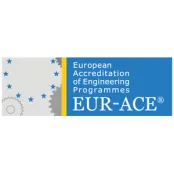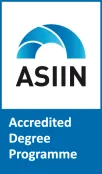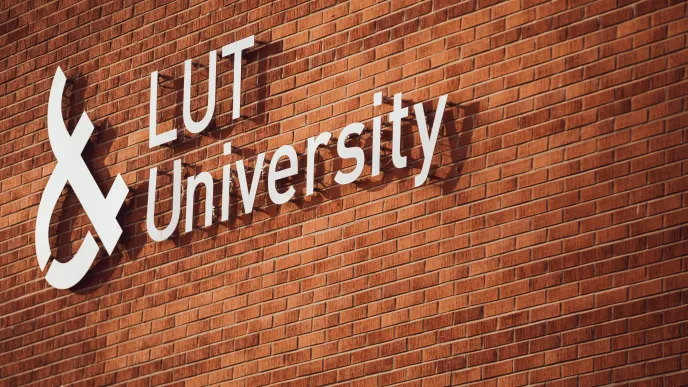The newsletter is your guide to what's happening on LUT campuses and the student community as well as to bachelor's and master's programmes updates and admission instructions. Newsletters will be delivered to your email once a month.


The programme is accredited by international EUR-ACE® and ASIIN standards for high quality degree programmes in engineering.
In every investment decision, a growing need to contribute more effectively to sustainability challenges has to be taken into account.
Climate warming, weakening air quality, water pollution and waste are examples of current global sustainability challenges. Sometimes traditional technologies offer the best solutions, but we also need novel solutions to complex environmental problems.
Solutions to these global challenges, such as environmental sustainability, call for systems thinking. We need to understand the context in which a product is going to operate and whether it relates to the need to reduce emissions, use less oil-based fuel or water, end-of-life disassembly, or marketing in a region which taxes based on a footprint.
The ability to conduct sustainability assessments is central to the programme. By understanding the broader context in which the challenges lie, we are able to identify more sustainable solutions.
In this programme, you will learn to identify the challenges of sustainability and view them in a multidisciplinary way, producing solutions which take all aspects of sustainability in society into consideration. You will also learn how to approach complex value chains in a purposeful, analytical and creative way in order to find answers to different aspects of sustainability.
You will take courses on life cycle management, renewable energy and energy efficiency, waste management, emission control and reduction, climate change, and sustainable business and innovation.
Your studies will focus on industrial and corporate processes and practices, enabling you to acquire knowledge and skills to introduce sustainability solutions to the corporate and government sectors.
Admissions guide 2026
What will you learn in the programme?
After completing the programme, you will know how to manage environmental issues in a way that profits business and the environment, model life cycles and make sustainable decisions in demanding situations.
You will be able to recognise opportunities offered by new technological innovations to promote sustainable development.
You will acquire:
- skills to recognise the most significant environmental impacts of products and processes and their importance in terms of business; you will be able to apply theories and the most recent scientific knowledge to solve problems involving environmental aspects;
- competence to understand the requirements of systemic change and analyse how competitive in terms of environmental impacts and costs a certain technology, product or service is in different operating environments; you will be able to work as an environmental expert in a range of decision-making situations and produce and convey information to support stakeholders in environmental decision-making;
- knowledge about technical possibilities of industrial, service, community, and primary production processes and systems to minimise environmental impacts; you will be able to explain the complex interdependencies of both local and global environmental problems and apply theories to come up with the most sustainable product or process design.
Degree structure and studies
The Master's Programme in Sustainability Science and Solutions takes two years. It leads to the degree of Master of Science in Technology, M.Sc. (Tech.), which is 120 ECTS credits.
The programme includes core, advanced specialisation, minor and elective studies as well as a Master's thesis. Read more in this academic year’s curriculum.
Quality of education
The high quality of education is one of the most important principles on which we will not compromise. International programme accreditations ensure the continuous development of our education and the international recognition of the degrees of our graduates. LUT University was one of the world’s top 300 universities in the THE World University Rankings 2024, which is one of the most highly regarded university ranking systems.
The systematic quality assurance procedures that we have developed over a long period guarantee the high quality of our degree programmes and the strong competence of our graduates in the future labour market. The underpinning elements of our education quality are the contents of our degree programmes, which are based on innovations of scientific research and the needs of the working world, and active student–teacher interaction. We evaluate the quality of our education through several follow-up procedures and feedback channels (e.g., course feedback, graduate feedback, alumni feedback, thesis commissioners’ feedback).
Career prospects
After graduation, you will have good competencies to work in international and multidisciplinary environments.
As a graduate, you will be able to work in industry, consultancies, regulatory agencies, and governmental and non-governmental organisations, where growing interest in sustainability has created new employment opportunities.
Graduates from this programme have found employment as environmental specialists in consulting companies, sustainability specialists in industry, environmental managers in industrial enterprises, sustainability specialists and researchers at research institutes, climate experts for municipalities, environmental specialists in the energy industry, environmental officers for government authorities, environmental and safety specialists in industry, municipal environmental managers, and environmental authorities.
You will also obtain a firm basis to continue your studies in doctoral programmes.
Contact Admissions Services
The LUT Admissions Services are here to assist you in all matters related to applying to international bachelor's and master's programmes.
For questions about admission criteria or entry requirements, please reach out to us by email: admission@lut.fi.
Chat with our students
Do you want to know more about studying at LUT, student life, or housing on LUT's campuses?
For questions about admission to bachelor's or master's degree studies, please email admission@lut.fi.



